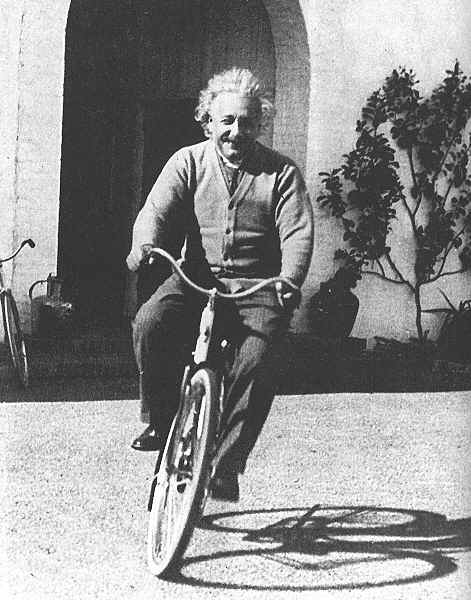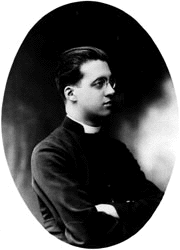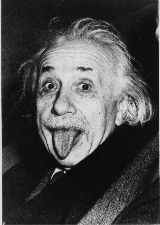Before Hubble and others discovered that galaxies are
receding away from us and that therefore the Universe must be expanding, Einstein
predicted from his Theory of Relativity that if the Universe contains any
matter at all [which it obviously does!], then it must either be expanding or contracting.
Einstein was an unconventionally but deeply religious man, once stating: "I want to
know how God created this world. I want to know His thoughts. The rest are details."
He firmly believed from a religious/philosophical perspective that the Universe must be
static so he introduced a mathematically permissible but otherwise ad hoc constant (called
the "Cosmological Constant") into his solution to force a static result; it
produces a repulsive force to counteract gravity. Because it was driven by philosophy and
not observation, he later viewed this as his biggest mistake! (picture
from http://www.th.physik.uni-frankfurt.de/~jr/physpiceinstein.html)
contains any
matter at all [which it obviously does!], then it must either be expanding or contracting.
Einstein was an unconventionally but deeply religious man, once stating: "I want to
know how God created this world. I want to know His thoughts. The rest are details."
He firmly believed from a religious/philosophical perspective that the Universe must be
static so he introduced a mathematically permissible but otherwise ad hoc constant (called
the "Cosmological Constant") into his solution to force a static result; it
produces a repulsive force to counteract gravity. Because it was driven by philosophy and
not observation, he later viewed this as his biggest mistake! (picture
from http://www.th.physik.uni-frankfurt.de/~jr/physpiceinstein.html)
 Georges Lemaitre realized a few years later (in the 1930s) that
Hubble's observations of receding galaxies coupled with both his and Aleksandr Friedmann's
solution to Einstein's equations proved that the Universe must be expanding. (picture
from R. McCray, http://cosmos.colorado.edu/astr1120/lesson12.html)
Einstein was not initially supportive, writing:
Georges Lemaitre realized a few years later (in the 1930s) that
Hubble's observations of receding galaxies coupled with both his and Aleksandr Friedmann's
solution to Einstein's equations proved that the Universe must be expanding. (picture
from R. McCray, http://cosmos.colorado.edu/astr1120/lesson12.html)
Einstein was not initially supportive, writing:
The results concerning the non-stationary world, contained in [Friedmann's]
work, appear to me suspicious. In reality it turns out that the solution given in it does
not satisfy the field equations.
but later he realized the mistake was his:
In my previous note I criticised [Friedmann's work On the curvature of Space].
However, my criticism, as I became convinced by Friedmann's letter communicated to me by
Mr Krutkov, was based on an error in my calculations. I consider that Mr Friedmann's
results are correct and shed new light. 
Recent observations of white-dwarf supernovae suggest that the Universe
is now accelerating its expansion, causing us to re-invent the cosmological constant and
to believe it might have been Einstein's biggest insight! (pictures
from http://www.rbe.net.au/~staylord/einstein.html,
http://www.th.physik.uni-frankfurt.de/~jr/physpiceinstein.html,
http://charm.physics.ucsb.edu/people/hnn/physicists.html
 contains any
matter at all [which it obviously does!], then it must either be expanding or contracting.
Einstein was an unconventionally but deeply religious man, once stating: "I want to
know how God created this world. I want to know His thoughts. The rest are details."
He firmly believed from a religious/philosophical perspective that the Universe must be
static so he introduced a mathematically permissible but otherwise ad hoc constant (called
the "Cosmological Constant") into his solution to force a static result; it
produces a repulsive force to counteract gravity. Because it was driven by philosophy and
not observation, he later viewed this as his biggest mistake! (picture
from http://www.th.physik.uni-frankfurt.de/~jr/physpiceinstein.html)
contains any
matter at all [which it obviously does!], then it must either be expanding or contracting.
Einstein was an unconventionally but deeply religious man, once stating: "I want to
know how God created this world. I want to know His thoughts. The rest are details."
He firmly believed from a religious/philosophical perspective that the Universe must be
static so he introduced a mathematically permissible but otherwise ad hoc constant (called
the "Cosmological Constant") into his solution to force a static result; it
produces a repulsive force to counteract gravity. Because it was driven by philosophy and
not observation, he later viewed this as his biggest mistake! (picture
from http://www.th.physik.uni-frankfurt.de/~jr/physpiceinstein.html) Georges Lemaitre realized a few years later (in the 1930s) that
Hubble's observations of receding galaxies coupled with both his and Aleksandr Friedmann's
solution to Einstein's equations proved that the Universe must be expanding. (picture
from R. McCray,
Georges Lemaitre realized a few years later (in the 1930s) that
Hubble's observations of receding galaxies coupled with both his and Aleksandr Friedmann's
solution to Einstein's equations proved that the Universe must be expanding. (picture
from R. McCray, 